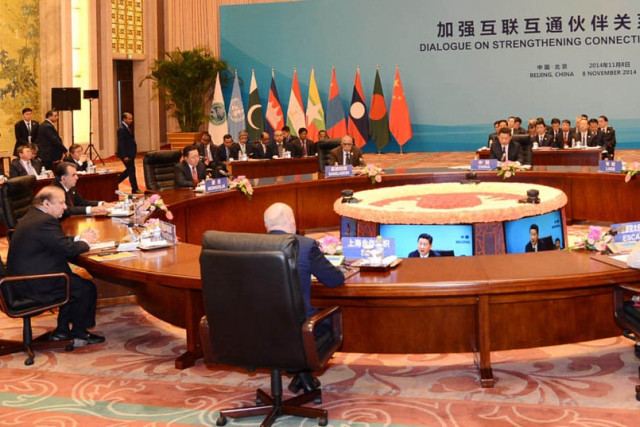Asia-Pacific ministers pledge to step up graft fight
Prime Minister Nawaz Sharif calls for stronger, broader linkages between Asian leaders

But it remained unclear how effective the move would be, amid apprehension in some countries over returning suspects to China due to fears they could be subject to abuse and denied legal due process.
The anti-corruption proposal is said to have been pushed by China and backed by the United States at the Asia-Pacific Economic Cooperation (APEC) gathering, which culminates in a two-day summit of leaders from 21 member-economies starting Monday.
China in July launched its so-called "Fox Hunt", a campaign to bring back corrupt officials or their family members who have fled abroad with ill-gotten gains.
Since taking office last year, President Xi Jinping has made the graft fight a central theme of his administration as public anger swells over widespread corruption.
A report attributed to China's central bank and leaked three years ago said that as many as 18,000 corrupt officials had left the country over the two decades to 2008, taking as much as $123 billion with them.
In a statement, APEC ministers pledged to step up nascent anti-graft efforts with a regional commitment to "deny safe haven to those engaged in corruption, including through extradition".
But they stressed that such moves would be "subject to domestic laws and policies" and needed to be carried out "in accordance with fundamental legal principles of each economy".
"We, APEC member economies, recognise that corruption impedes economic sustainability and development, threatens social security and fairness, undermines the rule of law, and erodes government accountability, as well as public trust," the statement said.
It pledged to establish an office for the day-to-day running of the APEC Network of Anti-Corruption Authorities and Law Enforcement Agencies (ACT-NET), a body coordinating anti-corruption efforts that was launched by Chinese and US officials in August.
The office will "assist in detecting, investigating and prosecuting corruption, bribery, money laundering, and illicit trade" and seek cooperation on tracking cases across borders.
China has recently announced stepped-up efforts to extradite former officials suspected of corruption from countries including Australia, New Zealand and Canada.
Australian police said last month that they would work with their Chinese counterparts to track down and seize illegal assets, but foreign concerns over the country's legal system linger.
Anti-corruption efforts with the Communist Party are carried out by an internal body which operates without any legal oversight, and there is concern that the crackdown may be used for political faction-fighting.
APEC Secretariat Executive Director Alan Bollard said last week the proposal had been pushed by China and the United States.
Bollard said any anti-corruption effort "needs to happen within the different laws and legal structures" of APEC members, but the statement did not spell out how this would work.
Nawaz calls for stronger, broader linkages between Asian leaders
Meanwhile, Prime Minister Nawaz Sharif noted that the solution to myriad of problems that Asian states face lies in greater connectivity between Asian countries.
He emphasised that for the people to absorb the idea of ‘connectivity’, states will have to go beyond material goals. Connectivity must harmonise with deeper human values while people-to-people connectivity remained as important as material connectivity, if not more.
“Ideas matter more than bricks and mortar,” he added.
He pointed towards multi-national economic projects such as the Pakistan-China economic corridor, CASA-1000 and TAPI pipeline as examples in this regard.
“The China-Pakistan economic corridor, linking China’s West to Pakistan’s southern port of Gwadar in close proximity to the Middle East, is a flagship project which both governments are pursuing vigorously," Nawaz said in his address at the dialogue on “Strengthening Connectivity Partnership.”
Further, he said Pakistan is already looking forward to greater regional connectivity with China and its partners in Central Asia. “Soon, CASA-1000 power project between Kyrgyzstan, Tajikistan, Afghanistan and Pakistan will alleviate our energy shortfall to some extent. The TAPI and Iran-Pakistan gas pipeline projects are also being fast-tracked.”
The premier raised a number of related questions arising out of steps to manage such a monumental transformation, creation of economic opportunities for billions of people living in our region, and more importantly, the issues of poverty and wealth inequality.
Nawaz further said that they could create massive technological and physical infrastructure within the Asian countries. One way of doing that is through adequate spending on infrastructure.
“I believe that Asia would need trillions of dollars in infrastructure in the next few decades.”
He stressed that Asian states have to realise that their national budgets alone could not meet the gigantic challenge, hence requiring a collective vision and leadership to pursue that task.



















COMMENTS
Comments are moderated and generally will be posted if they are on-topic and not abusive.
For more information, please see our Comments FAQ